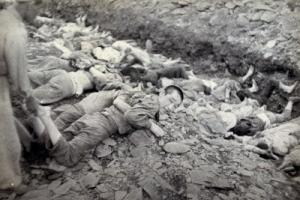A Special Obscenity
Jacobin
 The Korean War was central to the militarization of our society and to the creation a national security state. It was an essential element in fostering racism, sexism and in the cutting of social programs - creating growing inequality. Today, the threat of a cataclysmic war between Washington and North Korea cannot be discounted. It is vital for the US public to know that North Korea has been asking for a peace treaty with Washington and Seoul for sixty-four years.
The Korean War was central to the militarization of our society and to the creation a national security state. It was an essential element in fostering racism, sexism and in the cutting of social programs - creating growing inequality. Today, the threat of a cataclysmic war between Washington and North Korea cannot be discounted. It is vital for the US public to know that North Korea has been asking for a peace treaty with Washington and Seoul for sixty-four years.
 As Trump faces down North Korea, it’s alarming to think that most of the world’s nuclear warheads are now in the hands of men who are prepared to use them. We do know that Donald Trump has been obsessed since the 80s with nuclear weapons, that he refuses to take advice from military professionals and that he seems not to understand the core NATO concept of nukes as a political deterrent, as opposed to a military super weapon.
As Trump faces down North Korea, it’s alarming to think that most of the world’s nuclear warheads are now in the hands of men who are prepared to use them. We do know that Donald Trump has been obsessed since the 80s with nuclear weapons, that he refuses to take advice from military professionals and that he seems not to understand the core NATO concept of nukes as a political deterrent, as opposed to a military super weapon.
On the 50th anniversary of Rev. Dr. Martin Luther King, Jr.'s Poor People's Campaign, new opportunites to go on the offensive and to unite the poor against the root causes of racism, war, poverty, and climate crisis.
 The US missile attack on Syria took place on the anniversary, one hundred years ago, of the United States’ entry into World War I. Writing in The Progressive in June 1917, Senator La Follette said that the war party, "justifies entrance into the conflict on the ground that it is in the interest of democracy. If there is no sufficient reason for war, the war party will make war on one pretext, then invent another, possibly more effective, pretext after war is on."
The US missile attack on Syria took place on the anniversary, one hundred years ago, of the United States’ entry into World War I. Writing in The Progressive in June 1917, Senator La Follette said that the war party, "justifies entrance into the conflict on the ground that it is in the interest of democracy. If there is no sufficient reason for war, the war party will make war on one pretext, then invent another, possibly more effective, pretext after war is on."
 Donald Trump just ordered the launch of dozens of Tomahawk missiles to strike Syria. It's an illegal and unauthorized escalation that could have devastating consequences, killing innocent Syrians and U.S. service members. Escalation against Syria will not help the victims of this heinous chemical attack, it will not bring the devastating war in Syria to a quicker end, it will not bring back the dead children. It will not defeat ISIS or end terrorism.
Donald Trump just ordered the launch of dozens of Tomahawk missiles to strike Syria. It's an illegal and unauthorized escalation that could have devastating consequences, killing innocent Syrians and U.S. service members. Escalation against Syria will not help the victims of this heinous chemical attack, it will not bring the devastating war in Syria to a quicker end, it will not bring back the dead children. It will not defeat ISIS or end terrorism.
 Last Friday, Donald Trump made his first visit to the Pentagon where he spoke of signing an order to begin "a great rebuilding of the armed services of the United States." This will mean a massive surge in federal dollars pouring into the abyss of the Pentagon, which has shown itself quite capable of absorbing such moneys in the past and seems to lack the slightest ability to account for what's done with them. (The Pentagon has never even managed to pass an audit.)
Last Friday, Donald Trump made his first visit to the Pentagon where he spoke of signing an order to begin "a great rebuilding of the armed services of the United States." This will mean a massive surge in federal dollars pouring into the abyss of the Pentagon, which has shown itself quite capable of absorbing such moneys in the past and seems to lack the slightest ability to account for what's done with them. (The Pentagon has never even managed to pass an audit.)
 The U.S. government, following the 9/11 attacks, expressed no intention of reforming its Constitution. It was left free of any procedure for exception or emergency. This does not mean that the United States has remained a more democratic country than France. Attacks against privacy, civil rights, and, above all, habeas corpus have proven even more virulent in the United States than in Europe.
The U.S. government, following the 9/11 attacks, expressed no intention of reforming its Constitution. It was left free of any procedure for exception or emergency. This does not mean that the United States has remained a more democratic country than France. Attacks against privacy, civil rights, and, above all, habeas corpus have proven even more virulent in the United States than in Europe.
 While Khan's speech was meant to tell everyone that Muslim Americans are proud and patriotic citizens, which is fine and true, there are also other ways to work for the good of the nation than fighting in its wars. To be a Muslim citizen of the United States, you don't have to die as a Muslim American. You can live as one, too.
While Khan's speech was meant to tell everyone that Muslim Americans are proud and patriotic citizens, which is fine and true, there are also other ways to work for the good of the nation than fighting in its wars. To be a Muslim citizen of the United States, you don't have to die as a Muslim American. You can live as one, too.
Spread the word